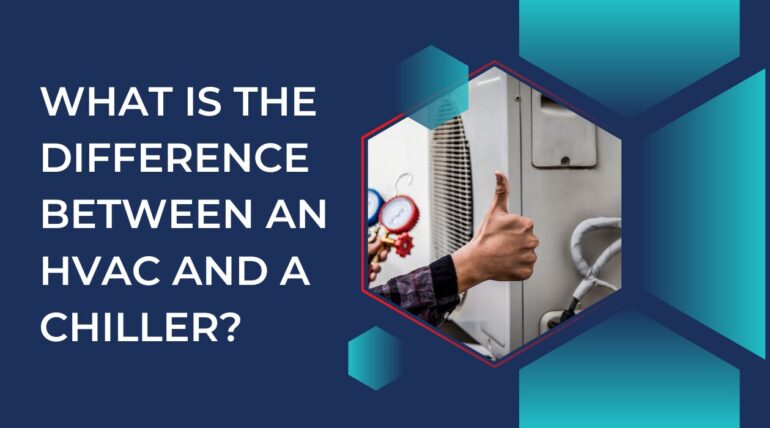
December 26, 2024
What is the difference between an HVAC and a chiller?
In the United Arab Emirates (UAE), where summer temperatures can soar above 50°C, effective cooling solutions are not just a luxury—they are a necessity. Two of the most common systems used for cooling in residential, commercial, and industrial applications are HVAC (Heating, Ventilation, and Air Conditioning) systems and chillers. While both serve the purpose of cooling, they operate differently and are designed for distinct applications. This blog will explore the differences between HVAC and chillers, their functionalities, applications, and how BestAirServices can assist you in choosing the right solution for your needs.
What is an HVAC System?
HVAC stands for Heating, Ventilation, and Air Conditioning. An HVAC system is a comprehensive solution designed to regulate indoor climate by controlling temperature, humidity, and air quality. In the hot climate of the UAE, air conditioning is particularly critical.
Key Features of HVAC Systems
Versatility:
- HVAC systems provide heating during cooler months, cooling during hot weather, and ventilation to improve indoor air quality.
- They can be used in various settings—from residential homes to large commercial buildings.
Components:
- Air Handlers: These units circulate air throughout the building.
- Ductwork: A network of ducts distributes conditioned air to different areas.
- Thermostats: Control the temperature settings within the space.
- Heating Units: May include furnaces or heat pumps for winter heating.
Energy Efficiency:
- Modern HVAC systems are designed to be energy-efficient, which is crucial in reducing electricity costs in regions with high cooling demands.
- Many systems now come with smart thermostats and energy-saving features.
Types of HVAC Systems:
- Split Systems: Commonly used in residential applications; consist of an outdoor compressor unit and indoor air handling units.
- Packaged Systems: All components are housed in one unit, typically installed on rooftops or outside buildings.
- Ductless Mini-Split Systems: Ideal for homes without ductwork; consist of an outdoor compressor and one or more indoor units.
What is a Chiller?
A chiller is a specific type of cooling system that removes heat from a liquid via a vapor-compression or absorption refrigeration cycle. The chilled liquid is then circulated through pipes to cool various processes or spaces.
Key Features of Chillers
Types of Chillers:
- Air-Cooled Chillers: Use ambient air to dissipate heat; suitable for smaller installations.
- Water-Cooled Chillers: Use water from a cooling tower to remove heat; ideal for larger applications requiring significant cooling capacity.
Applications:
- Chillers are primarily used in industrial applications for process cooling (e.g., manufacturing) or in large commercial buildings for central air conditioning.
- They can also be found in hospitals, data centers, and other facilities that require precise temperature control.
Capacity:
- Chillers can handle larger cooling loads compared to standard HVAC units, making them suitable for large facilities like shopping malls, hotels, and industrial plants.
Energy Efficiency:
- Modern chillers are designed to be highly efficient, often incorporating advanced technologies such as variable speed drives (VSDs) that adjust compressor speed based on demand.
Key Differences Between HVAC and Chillers
| Feature | HVAC Systems | Chillers |
| Purpose | Comfort cooling and heating | Process cooling or large-scale air conditioning |
| Design Complexity | Integrated system with multiple components | Standalone units focused on cooling |
| Cooling Method | Uses air circulation through ducts | Circulates chilled water or refrigerant |
| Capacity Handling | Suitable for smaller to medium spaces | Designed for large-scale applications |
| Seasonal Use | May have reduced function in cooler months | Operates year-round regardless of outside temperature |
| Energy Efficiency | Generally more efficient for small spaces | Highly efficient for large loads |
Choosing Between HVAC and Chillers
When deciding whether to install an HVAC system or a chiller, consider the following factors:
Application Needs:
- If you require comfort cooling for a residential or commercial space, an HVAC system may be more suitable.
- For industrial processes requiring precise temperature control or large commercial buildings with high cooling demands, chillers are often the better choice.
Space Requirements:
- Evaluate the space available for installation. Chillers typically require more space due to their larger components and associated equipment like cooling towers.
Energy Efficiency Goals:
- Both systems can be energy-efficient; however, chillers are often preferred in large applications where efficiency at scale can lead to significant cost savings.
Maintenance Considerations:
- Both systems require regular maintenance but may differ in complexity depending on their design and application.
BestAirServices: Your Trusted Partner in Cooling Solutions
At BestAirServices, we specialize in providing tailored solutions for both HVAC and chillers to meet the diverse needs of our clients in the UAE. Our services include:
- Expert Consultation: Our team of professionals will assess your specific requirements and recommend the most suitable cooling solution tailored to your needs.
- Installation Services: We ensure that your HVAC system or chiller is installed correctly for optimal performance and efficiency.
- Maintenance Plans: Regular maintenance services keep your systems running efficiently throughout the year—essential in the UAE’s extreme climate conditions.
- Emergency Services: We offer 24/7 emergency services to address any unexpected issues with your cooling systems promptly.
Conclusion
Understanding the differences between HVAC and chillers is essential for making informed decisions about your cooling needs in the UAE’s challenging climate. Whether you require comfort cooling or process cooling solutions, BestAirServices is here to provide expert guidance and support tailored to your specific requirements.
For more information about our services or to schedule a consultation with our team of experts, please contact us today! Let us help you achieve optimal comfort and efficiency in your indoor environments while ensuring reliable performance throughout the year.


